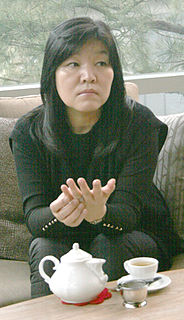A Quote by Hiroshi Hamaya
For years my only purpose was to do documentary photos for magazines, without any idea that they were part of a larger project. It was as if I were carried along by a stream - even though I believed that the current was taking me in the right direction.
Related Quotes
The stream of passing years is like a river with people being carried along in the current. Some are swept along, protesting, fighting all the way, trying to swim back up the stream, longing for the shores that they have passed, clutching at anything to retard their progress, frightened by the onward rush of the strong current and in danger of being overwhelmed by the waters. Others go with the current freely, trusting themselves to the buoyancy of the water.
The Beatles realized that what they were making in the studio could never be performed. And they had already given up on performing because there were too many screaming fans and they were playing in larger and larger venues so they couldn't even hear what they were playing, it just wasn't any fun any more.
I never looked at magazines before I started modeling. I was 13 or 14 and none of my friends were into magazines. We were into the fashion of the day, though. Designer jeans were really popular - Sasson, Gloria Vanderbilt, Calvin Klein, Jordache. Once I started modeling, I began to learn about these things, and magazines helped me to understand who was who.
The advertising men made it clear that there were two ways of looking at ideas in a war against fascism. Those of us who were working on the project believed ideas were to be fought for; the advertising men believed they were to be sold. The audience, those at home in wartime, were not 'citizens' or 'people.' They were 'customers.'
And that's why, when they want to get rid of anyone, they usually bring him down here (like they were doing with me) and say they'll leave him to the ghosts. But I always wondered if they didn't really drown 'em or cut their throats. I never quite believed in the ghosts. But those two cowards you've just shot believed all right. They were more scared of taking me to my death than I was of going.
I knew I liked art. I knew I liked photography. I remember seeing photos of Linda Evangelista in Italian Vogue as a teenager, and at the time I didn't know who she was. There were two photos - one shot by Fabrizio Ferri and another one by Steven Meisel. I didn't know who any of those people were. I think it was the first summer I was modeling, I saw these magazines sitting out and looked at them. I remember thinking, These are the kind of images I want to make.
The Oneida Perfectionists, along with some of the others, believed that feminism, and abolitionism, and other causes that they pursued in their own way without participating with other people outside of their communities, were all piecemeal reforms. That's what makes a utopian a utopian, this idea that they were going to create a whole new world from scratch.
A leaf that falls into a stream (or a leaf we intentionally drop into a stream) just where the water disappears into the ground...will come out again at the next opening, because the underground stream has faithfully carried it there, though during this journey it has been beyond the reach of any outside interference. In the same way, an idea that has been introduced into our minds (or that we ourselves have intentionally introduced) will produce its effects after longer or shorter subconscious development.
Curiously enough, the only two plays that I've done very much revision on were the two adaptations - even though the shape of them was pretty much determined by the original work. With my own plays, the only changes, aside from taking a speech out here, putting one in there (if I thought I dwelled on a point a little too long or didn't make it explicit enough), are very minor; but even though they're very minor - having to do with the inability of actors or the unwillingness of the director to go along with me - I've always regretted them.
Even though nobody knew that you were in my life, you were the person who brought a raft at every rapid current and helped me cross that water safely. I was happy that you were there. I came to tell you I was able to travel through my life because I could come to you when I was anxious, not when I was happy.



































